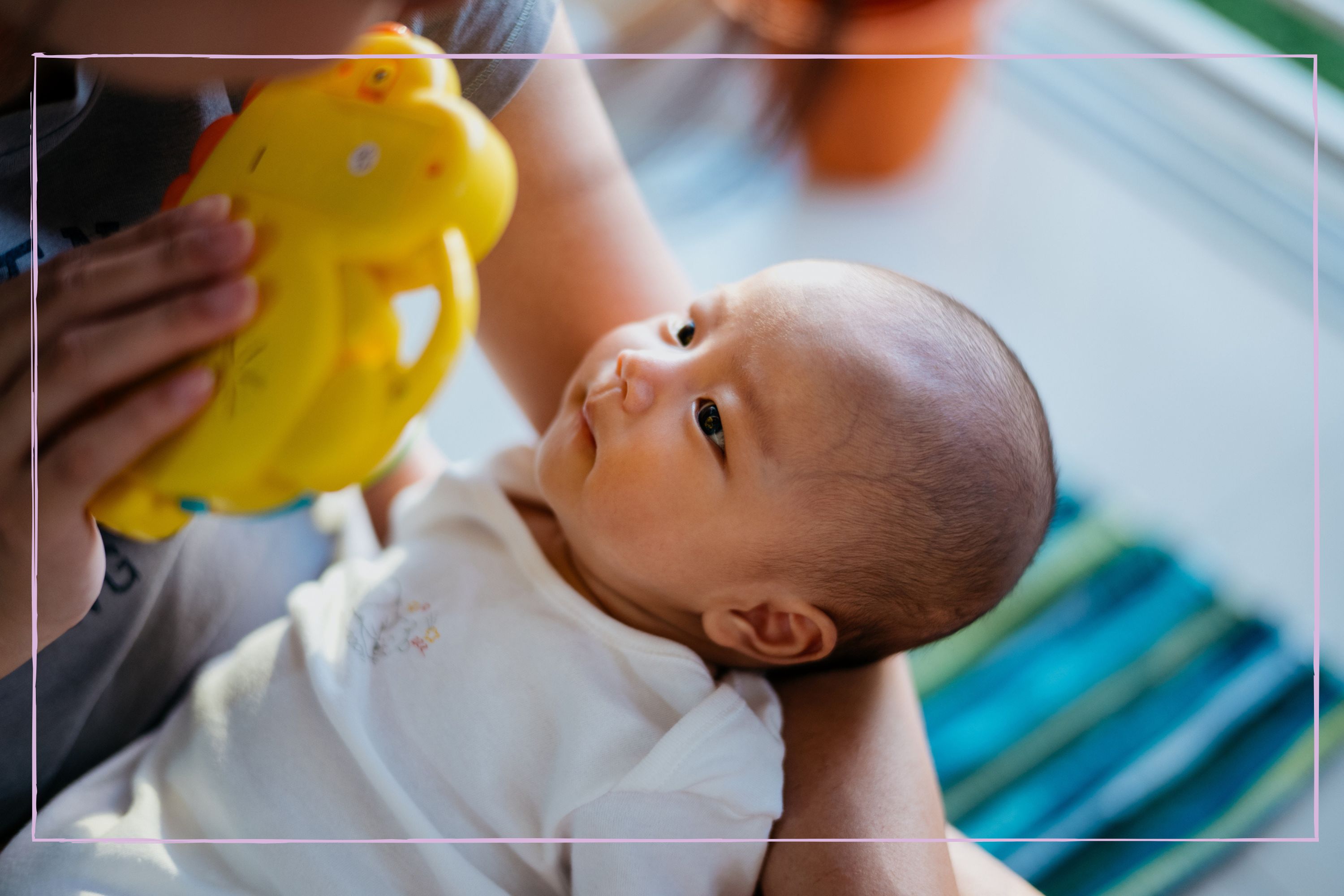Wondering how to play with a newborn? Here are 8 expert-approved ideas to try today (and #7 is simple and so effective)
How to play with a newborn is a question pondered by many new parents - you're not alone

How to play with a newborn can raise many questions for new parents, and those pondering how to do it definitely aren't alone.
Playing with a newborn baby might initially present some challenges for new parents. After carefully choosing the best pram for your needs and having the newborn baby essentials checklist all ticked off, playing with your new baby might not have been something you'd considered until they're in your arms. Although their physical abilities are limited, a newborn's constantly developing senses are essential for their growth and development. They might lack awareness of the best toys , but playing with them is an important part of their routine.
Qualified nanny and Early Years specialist, Kirsty Ketley tells us, that "To begin with babies see in black and white, but soon start seeing colour, so have a good variety available." Child development expert Lauren Brown added "During the first three months of life, a baby’s brain creates connections at a tremendous rate. It actually grows faster during this period than at any other. By the end of month three, their brain will be approximately 55% of its final adult size. So playing and interacting with babies during this time is hugely important to their development."
New mum, Alice admitted to us the difficulties she experienced in the first months of her baby's life. She told us: "I remember wondering if my newborn daughter even liked me. Newborn babies don't tend to give much away... they take loads and give nothing - not even a smile of recognition. No one warned me of that.
We have gathered expert opinions that reveal the vital role playtime has on a newborn's development. Parents offer their heartfelt anecdotes on what they learnt during the process of learning to play with their new baby. This article explores the importance of playing with a newborn, and cues to look out for suggesting your baby is ready to bring playing to an end.
How to play with a newborn
- Gentle touch and massage
- Tummy time
- Singing and talking
- Visual stimulation
- Baby-wearing
- Mirror play
- Draw on their skin with you fingertip
- Switch up where they play
Child development expert Lauren Brown spoke to us in depth about playing with a newborn, saying: "Newborn babies are exposed to thousands of new sensory inputs every second so keep things simple to avoid overstimulation. Parents are their baby’s biggest and best toy in the early days as they provide them with the love, care and attention they crave. Spending time cuddling, feeding and talking is crucial for the development of healthy brain circuits."
Lauren added "Babies’ eyesight is their least established sense at birth, with both their focal range and their perception of colour not yet fully developed. Over time they develop focus and the ability to move their eyes accurately and interpret colour. But in the first weeks the distance between the breast and face is about their focal limit, so using high contrast, black, white and red images will be most effective in the early weeks. Nowadays these types of high contrast images are available as books for babies and can also be easily found online."
Parenting advice, hot topics, best buys and family finance tips delivered straight to your inbox.
1. Gentle touch and massage
Gentle touch and massage are perfect for newborns as they find comfort in gentle touch. Massage their little hands, feet, and back to promote relaxation and bonding. Lauren Brown told us "Newborn babies have heightened sensory perception so sensory-based activities are perfect for newborns. A great example is baby massage, the gentle rhythmical stroking of different parts of the baby’s body, which is not only relaxing but has also been found to help with infant colic and weight gain."
2. Tummy time
Tummy time is a renowned practice for babies - which may 'seem to hate'. Mum-of-one, Kiran tells us; "Noah would cry every single time, he hated it. So I started lying him on my tummy to tummy - he was a lot calmer with that." Place the baby on their tummy while they are awake and supervised. This helps strengthen their neck and back muscles, preparing them for future milestones like crawling.
Kirsty Ketley agrees; "Tummy time is fab for helping them strengthen their neck and back muscles. You can lie next to your baby and sing or talk to them while they are on their tummy. As they get bigger, use toys to catch their attention or lay them on a colourful, textured play mat."

3. Singing and talking
Singing and talking to newborns is the easiest activity, simply narrating your moves or what you're doing that day will captivate them - newborns love the sound of their grown up's voices, and it helps stimulate their auditory senses.
4. Visual stimulation
Visual stimulation, such as black and white patterns or colourful toys catches your baby's attention. Move the objects gently to encourage visual tracking. Mum-of-two, Amee told us "When I had my second baby, my toddler really wanted to play with his sister. We settled on slowly turning the pages of a black and white book in front of her face. It was a great bonding activity for us, and a way to incorporate playing with the new baby into our day."
Amee's family loved the Teytoy high contrast sensory book set (£14.99, Amazon), saying "They were great books, and some had a crunchy texture which was a great introduction to different sensations when the baby started to grab."
5. Baby wearing
Baby-wearing, simply carrying your baby in a sling or carrier allows them to feel secure while providing opportunities for closeness and connection. You can narrate your daily activities or sing to your baby while wearing them.
6. Mirror play
Mirror play will fascinate them they might even attempt to interact with the "other" baby they see. Mum-of-two, Shellina recommended the Beetoy tummy time mirror toys (£12.99, Amazon). She said "This mat was a great all-rounder. Full of different shapes in both black and white and colour, it also encourages tummy time. My baby was rewarded with his own reflection when he pulled himself up, and we were rewarded with some big smiles once we could point to the reflection and he grinned at himself!"
Parenting expert, Kirsty Ketley tells us; "The best way to play with your newborn, comes from the things you instinctively do already. Bouncing, singing, rocking, talking, massaging, are all fab awake time activities."
She adds how imitation is a great way to help them understand that they are being heard; "copy the sounds that they make, they will love hearing it back. They will also love you copying their facial expressions too - be that grimacing, yawning or wide eyes."
7. Draw on their skin with a fingertip
Draw on their skin with a fingertip - Child development expert Lauren Brown suggested this simple activity, telling us "Another idea is to gently draw pictures with a fingertip on their skin, talking about the drawing at the same time, e.g. 'I’m drawing a house. Here is the door. Here is the window…' Research has found that children with 'talkative' parents have heard 30 million more words by the time they’re four and have higher IQ and larger vocabularies as a result."
8. Switch up where you play
Switch up where they play - Play in different rooms, where there are different sounds, smells, and light. Take them to baby sensory classes and other baby groups. Take them outdoors - lie them under a tree so they can watch the leaves swaying in the wind, go for a beach walk etc. Trust us, popping to Tesco can really take it out of a newborn - they will work hard to process all the different sights, sounds, and smells.
Mum-of-two Lucy has fond memories of baby sensory classes. She told us "I was self-conscious about playing with my newborn at first, but doing in a room with loads of other mums and a great instructor really put me at ease. We started baby sensory from six weeks old, and it turned into the highlight of our week. I actually cried when my son reached the age limit and we had to leave. But it was amazing to re-create what we'd done there at home. Plus I stayed in touch with lots of the mums - it was an all around win."
Lucy added "I feel so passionate about what I took from baby sensory, I've bought some Baby Sensory Boxes (£36, Not On The High Street) in recent years for friends who've had babies. They've gone down really well and provide a ready made solution to instantly playing with a new baby."
The importance of playing with a newborn
Research has shown that playing with newborns offers numerous benefits, from cognitive and emotional development to building the parent-child bond. According to Dr. Andrew Meltzoff, a developmental psychologist, "Playing with a newborn creates an environment that fosters brain development, emotional connection, and social skills."
Lauren Brown expanded on this, telling us "The time between birth and five years is crucial as this is when 90% of brain development occurs. Neuroscience tells us that the brain is at its most flexible and adaptable during this time. While we’re all born with a sort of basic brain blueprint, we need others to help us turn this 'plan' into a solid foundation. Parents and caregivers do this by providing us with the love, care and attention we need to thrive. Amazingly, a baby's brain is capable of making up to a million new connections each second and it’s these connections that make the child who they are."
Studies have indicated that play enhances a newborn's cognitive development by stimulating their senses and encouraging exploration. Simple activities like making eye contact, singing, or talking to the baby help develop their language and communication skills. Dr. Jane Smith, a child development expert, explains, "By engaging in play, newborns learn cause and effect, develop their attention span, and begin to understand the world around them."
Playing also contributes to emotional bonding. Dr. Mary Johnson, a paediatrician, states, "The love and nurturing a newborn receives during playtime can promote a secure attachment between parent and child, leading to long-lasting emotional benefits." The act of play provides an opportunity for parents to respond to their baby's cues, promoting a sense of security and trust.
The challenges of playing with a newborn
Playing with a newborn is not without its challenges. Many parents share anecdotes about the difficulties they face during playtime. Sleep deprivation, lack of energy, and a feeling of cluelessness are common sentiments. Megan, a first-time mother, shares, "I felt so overwhelmed trying to figure out what to do with my newborn during playtime. I often worried that I wasn't doing enough to stimulate her."
Parental exhaustion and the demanding nature of newborn care can make playtime feel daunting. However, it's crucial to remember that simple interactions and quality time are what truly matter. Dr. Jennifer Collins, a child psychologist, reassures parents, saying, "It's not about complex games or elaborate toys. Your presence, love, and attention are what make playtime meaningful for your newborn."
When to stop playing with your newborn
Lauren Brown suggested that parents should be aware of the amount of time their baby is spending awake, while learning their cues to bring play time to an end. She told us "Newborn babies sleep a lot. It’s easy to think that they only sleep or eat in the early days but very soon their time awake will get longer and longer, leaving more time to play. When this happens, it’s easy for babies to become tired, hungry or overstimulated.
She added "Overstimulation happens when the baby is receiving more inputs than they feel comfortable with. This might be too much activity, sound, light, sensation or simply feeling overwhelmed being passed around from person to person. Let’s face it, being the centre of attention for too long would be exhausting for most people after a while!"
Lauren encourages parents to look for the following behaviour from their newborn, to suggest they no longer want to engage in play:
- Become fussy or irritable (low-level noise)
- Turn their head away or stare
- Appear tired (yawning, stretching, and rubbing their eyes)
- Clench fists and make jerky or rigid body movements
- Cry (often louder than usual)
- Seems to only settle with mum (or the person who provides their milk).

Kirsty is a qualified early years practitioner and parenting consultant with a wealth of knowledge and experience from over 22 years of working with families and children from birth to the teenage years. Kirsty's career has seen her work in a variety of roles, from children's holiday rep and nursery nurse to over 16 years working as a daily nanny.

Lauren Brown is founder of the multi award winning, Busy Brains Activity Packs, dedicated to creating play-based activities for babies, toddlers and children under five. She is a former Primary School Deputy Headteacher and child development expert.
Teaching yourself how to play with your baby isn't always easy. We look into sensory play and the benefits as well as the the best outdoor toys, and best toys for 6-month-olds - we've found some great buys.
Stephanie has been a journalist since 2008, she is a true dynamo in the world of women's lifestyle and family content. From child development and psychology to delicious recipes, interior inspiration, and fun-packed kids' activities, she covers it all with flair. Whether it's the emotional journey of matrescence, the mental juggling act of being the default parent, or breaking the cycle of parenting patterns, Stephanie knows it inside out backed by her studies in child psychology. Stephanie lives in Kent with her husband and son, Ted. Just keeping on top of school emails/fundraisers/non-uniform days/packed lunches is her second full-time job.